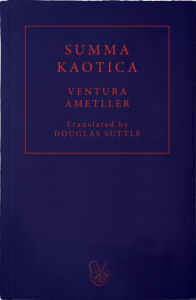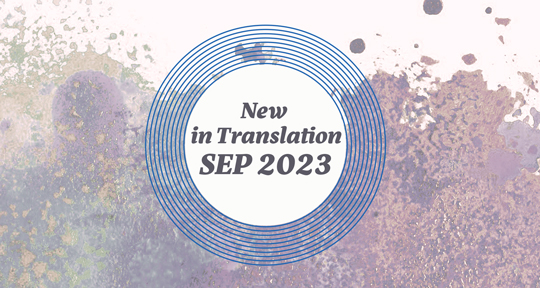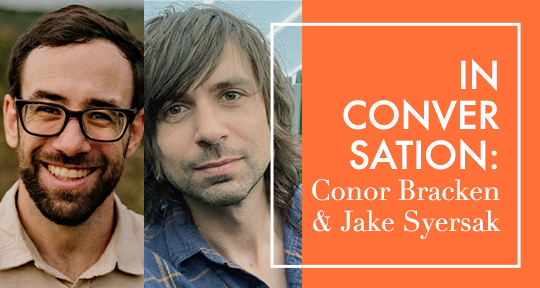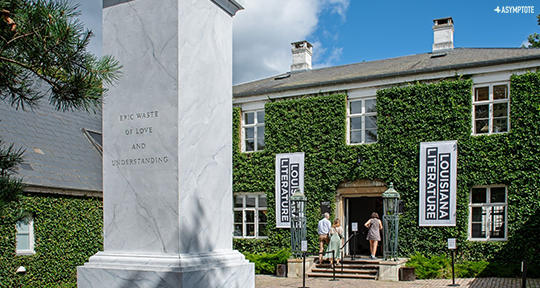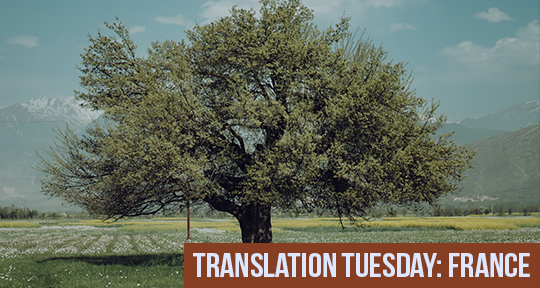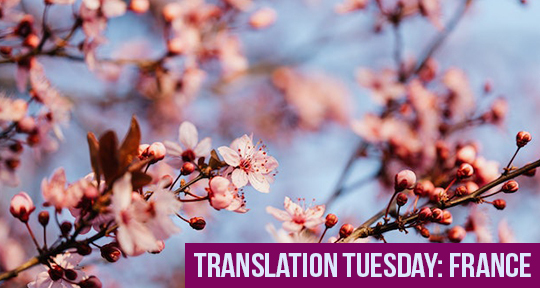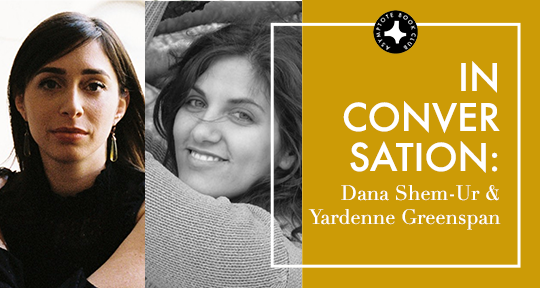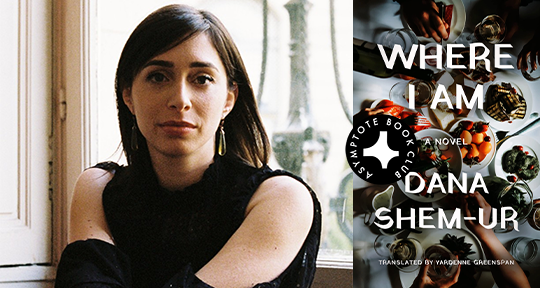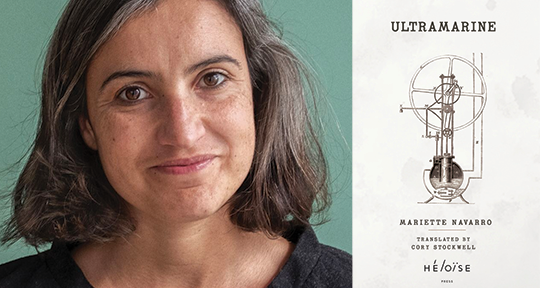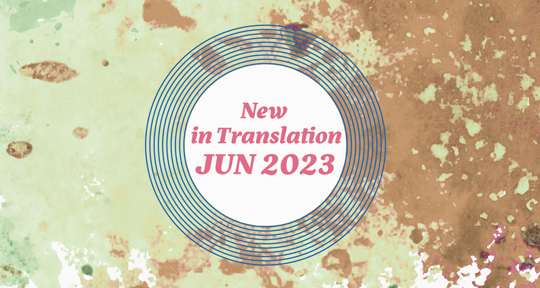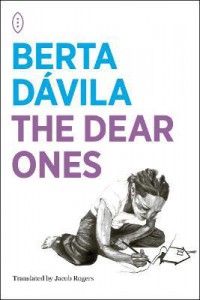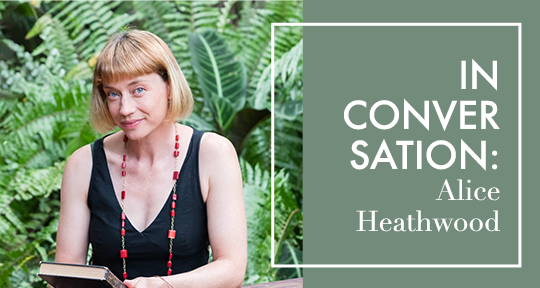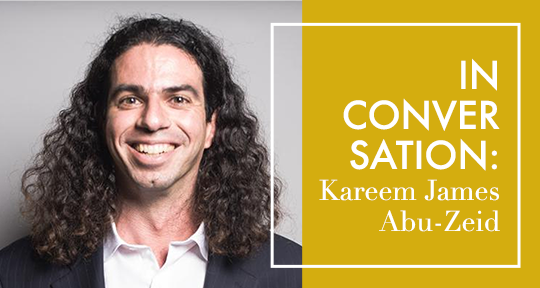This Translation Tuesday, a melodic love story for the ages floats in the air, transporting us to a time of dueling knights and castle towers. Hear from Timothy Perry, translator of “She Sits Beneath Her Father’s Olive Tree” by Audefroi Le Bastart, on appropriation in the layered histories of France’s medieval weaving songs: an oral tradition of working women recorded in writing by men:
“The weaving songs of medieval France do not survive. Which is to say, the traditional songs of women engaged in textile work—a largely oral tradition—do not survive. In their place, we have approximations to this genre written by men in a purely literary context. These literary weaving songs, with their themes of courtly love, (artfully) simple language, and repetitive rhythms, attempt to preserve the ‘feel’ of the oral tradition, but their appropriation of it results in a problematic shift in perspective—narratives involving the objectification and abuse of women take on an entirely different tenor when taken from a context of women’s work and transformed into a male literary exercise. The resulting poems have been considered among the finest lyrical creations of medieval French literature, but their casual misogyny raises timely (and timeless) questions about how we should read aesthetically accomplished but morally tarnished works, and how we should translate them.
The ‘weaving song’ translated here tells the story of Idoine and the obstacles to her love. The poem upends the conventions of courtly love by presenting everything—even martial pursuits—though Idoine’s eyes, resulting in a complex layering of gender: a male poet writing in a female genre presents male activities through the eyes of a female character. Despite this complexity, the misogyny outlined above remains very much present and I have tried both to draw attention to and undercut it. For example, the French text mentions the aesthetic qualities of Idoine’s hair even as she is being dragged by it, but in an unemphatic way: ‘[the queen] takes her by the hair, which she has blonde like wool’. I have heightened this aestheticization of Idoine’s suffering by overtranslating the prosaic ‘takes’ as ‘grasps’ and by expanding the description of the hair from half a line to a whole line and setting it off between dashes. Elsewhere, however, I employ vocabulary not found in the French to undercut the poem’s ‘happy’ ending. Twice my translation describes Idoine as the ‘captive’ of her love Garsiles. On the first occasion, the French simply says that her love for him ‘preoccupies’ her; on the second, which occurs at a point in the poem when her father is literally holding her captive in a tower, the French simply says that she is still ‘taken with’ Garsiles. And when Garsiles fights to rescue Idoine, after which they will marry, I describe him as ‘an iron tower of strength’, though the French says merely that he has ‘prowess and strength’. By presenting Garsiles as a tower and Idoine as his captive, I try to suggest that Idoine’s plight as a wife may not be so different from what it was as a daughter.
Despite these changes in emphasis, my translation attempts to preserve the straightforward vocabulary and syntax of the original; to reflect the importance of rhythm in weaving songs, I have employed a fairly strict iambic pentameter.”
She sits beneath her father’s olive tree
And carries on a quarrel with her love.
Her sighing heart complains: ‘Such suffering!
No song, no flute, no music moves me now:
Without you here I have no will to live.
XXXXXWhoever has love’s grief and pain
XXXXXShould also have love’s joy.
How long must I endure this misery?
How long, my love, tormented by your love?
I am your captive, Count Garsiles, and I
Will waste my youth on weeping and on tears,
With no escape unless I feel your touch.
XXXXXWhoever has love’s grief and pain
XXXXXShould also have love’s joy.
I curse the hour in which my father called
For war, a war that brought your army to
This place, a war that you, by strength of arms,
Soon turned to peace—but not before it took
The lives of many knights. I curse the hour!
XXXXXWhoever has love’s grief and pain
XXXXXShould also have love’s joy.
But all this country would have been laid waste
And all the common people left to die
If you had not brought peace—if you had not
With reckless charges, wild assaults, brought peace.
And now, in love, I lie awake at night.
XXXXXWhoever has love’s grief and pain
XXXXXShould also have love’s joy.
War at an end, peace in the land, and you,
Your army waiting, ready to depart,
Offered yourself, a blameless man, to me—
A blameless man, the robber of my heart.
XXXXXWhoever has love’s grief and pain
XXXXXShould also have love’s joy.
To trace your beauty is my greatest joy:
So elegant, so noble and refined—
You never seek to do me any harm.
Such is my love that I could never be
Distressed, or wish my heart my own again.
XXXXXWhoever has love’s grief and pain
XXXXXShould also have love’s joy.
What can I do, my love? I am in such
Distress! Your beauty, strength—your gentleness—
Have lodged love’s wounding arrow in my heart;
No one but you can cut it out again,
For both the arrow and the heart are yours.’
XXXXXWhoever has love’s grief and pain
XXXXXShould also have love’s joy.
While beautiful Idoine weeps and laments
The man she loves, the man she would consume…
But look! Her servant, searching anxiously,
Comes running down the grassy path and finds
Her lady, overcome by misery.
XXXXXWhoever has love’s grief and pain
XXXXXShould also have love’s joy.
‘My lady, please, you must rein in your heart—
You have indulged your anger and your pain
Too much today. The king and queen have seen
How you behave. They say it lacks good sense.’
Too late! Now all is lost—her mother comes.
XXXXXWhoever has love’s grief and pain
XXXXXShould also have love’s joy.
The queen now grasps her hair—she has blonde hair,
Pale as a fleece—and makes her stand before
The king; she lists her faults—she knows them well—
And he replies: ‘Take her at once and lock
Her in the highest tower. But beat her first.’
XXXXXWhoever has love’s grief and pain
XXXXXShould also have love’s joy.
He has the girl ungirdled and undressed
And any part of her his rein can reach
He strikes; he turns her flesh from white to red.
At last, believing that her punishment
Is just, he has her locked in a high tower.
XXXXXWhoever has love’s grief and pain
XXXXXShould also have love’s joy.
Now beautiful Idoine is left alone,
Locked in the tower; but even there her heart
Remains unchanged—such is her love for Count
Garsiles that she holds nothing dearer in
The world. He holds her captive and she weeps.
XXXXXWhoever has love’s grief and pain
XXXXXShould also have love’s joy.
Three years Idoine is kept locked in the tower,
Three years, three mournful, tearful, rueful years.
‘My love,’ she says, ‘how long I wait for you!
Such is my love—such is my rage—they hold
Me in this tower, where I will die for you.’
XXXXXWhoever has love’s grief and pain
XXXXXShould also have love’s joy.
She cries aloud again; she weeps; she says:
‘Locked in this tower, my love, I have endured
For you so many weeks of pain-filled love…
I’m overcome by weakness…cannot stand…’
She speaks; she faints; she—voiceless, breathless—falls.
XXXXXWhoever has love’s grief and pain
XXXXXShould also have love’s joy.
The king now hears the cries and stands amazed—
He wonders that they do not die away.
Quick as a deer he comes, runs to the tower,
And finds Idoine, his daughter, in her faint.
He takes her in his arms, no longer glad.
XXXXXWhoever has love’s grief and pain
XXXXXShould also have love’s joy.
The king is speechless in his grief; the queen
Approaches, anguished, overcome. At last,
When beautiful Idoine, sighing, revives,
He says: ‘This love, Idoine, it sickens you.’
And when she can reply: ‘I know, my king,
That I must die, and die in misery.’
XXXXXWhoever has love’s grief and pain
XXXXXShould also have love’s joy.
‘Daughter, how pale you have become, how changed—
This is no feigned, no counterfeited love!
A love so true that it will be your death.’
‘Without Garsiles I am already dead.
There is no need for this imprisonment.’
XXXXXWhoever has love’s grief and pain
XXXXXShould also have love’s joy.
‘But if you wish to marry I could find
Some royal son, some proud and powerful prince.’
‘I will not marry any man but him,
The count Garsiles—so wise, so beautiful,
And (but for you) as brave as any knight.’
XXXXXWhoever has love’s grief and pain
XXXXXShould also have love’s joy.
At last he understands—she will not look
Elsewhere. The king declares a tournament—
Why wait?—to be held there in the broad space
Beneath the tower. He offers as a prize
Idoine, refined, beyond the least reproach.
XXXXXWhoever has love’s grief and pain
XXXXXShould also have love’s joy.
Word of the trial—word of the prize—soon spreads,
More pleasing to the ear than harp or viol.
All say that they will go to win the girl,
To shatter lances in the name of love.
XXXXXWhoever has love’s grief and pain
XXXXXShould also have love’s joy.
The knights arrive from many far off lands—
Driven by love, not one remains behind.
Their gorgeous banners crowd around the tower—
Garsiles is there, and all his company.
The tournament begins and all fight hard.
XXXXXWhoever has love’s grief and pain
XXXXXShould also have love’s joy.
Idoine—is there a purer name in France?—
Now watches from her window as the knights
Advance and, out of love, she gives her love
Her sleeve; he throws himself into the fight—
No purer knight has ever held a lance.
XXXXXWhoever has love’s grief and pain
XXXXXShould also have love’s joy.
The Tournament beneath the Ancient Tower—
A noble tournament. Each does his best
To win Idoine, but she cries out for help:
‘Garsiles, you must not hesitate to fight
With any knight and throw him from his mount.’
XXXXXWhoever has love’s grief and pain
XXXXXShould also have love’s joy.
An iron tower of strength, Garsiles fights well;
He breaks the shield of every knight he meets—
Breaks it like bark—and with the shield the man;
All this for love of beautiful Idoine.
XXXXXWhoever has love’s grief and pain
XXXXXShould also have love’s joy.
Garsiles has won the tournament; the king
Gives him the prize; the prize becomes his wife.
He takes her back in honour to his lands.
Their love is faithful, sweet, and true—at last
Idoine has won all that her heart desires.
XXXXXWhoever has love’s grief and pain
XXXXXShould also have love’s joy.
Translated from the French by Timothy Perry
Audefroi le Bastart was from Arras in Northern France and was active in the late 12th and early 13th centuries, but beyond that little is known of his life. Of the twenty or so poems identified as belonging to the genre of weaving song, five have been securely attributed to him, more than to any other poet. Arras was an important literary centre during Audefroi’s life and he may have had ties with other well-known poets from the town, including Jean Bodel, Conon de Béthune, and Adam de la Halle.
Timothy Perry is the Medieval Manuscript and Early Book Librarian at the Thomas Fisher Rare Book Library, University of Toronto. He holds a PhD in Classics and has published on ancient and medieval Greek literature and the history of the book. His current project is a translation of the complete surviving corpus of Old French weaving songs.
***
Read more from Translation Tuesdays on the Asymptote blog:
